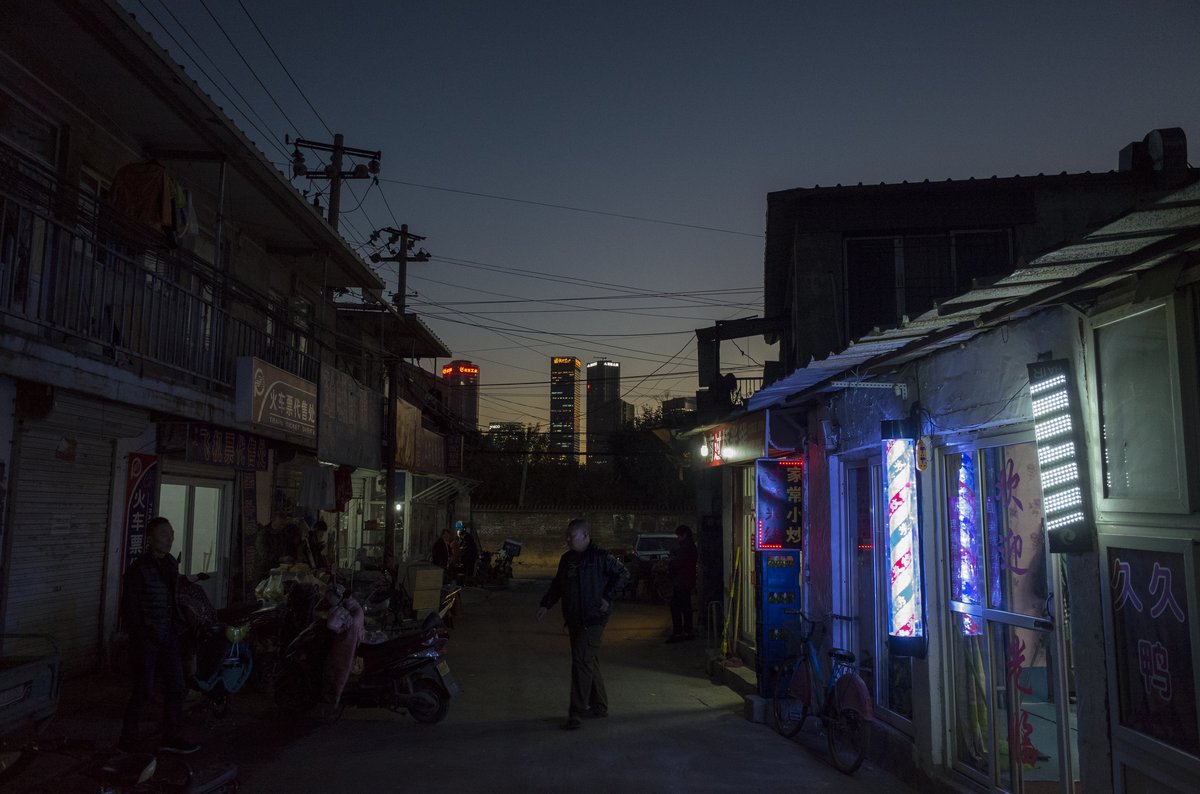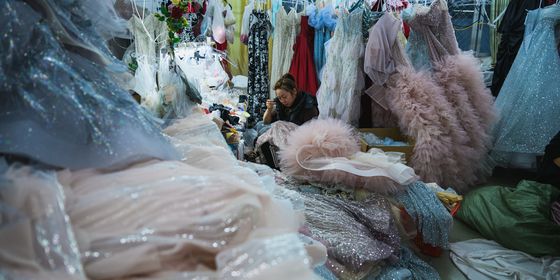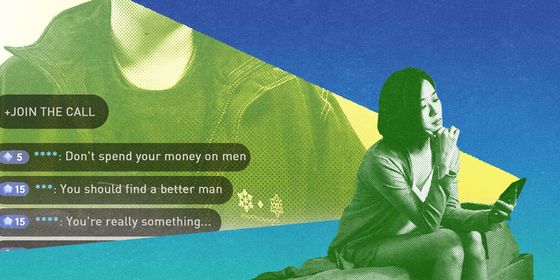A young woman reminisces about growing up and learning about love, life, and family in the red-light district
How many sex workers are there in China? This is a question that even sociologists will find hard to answer. And there is even less research on the family, marriage, and children of sex workers.
We often say that female sex workers are at the most marginal members of society. Certainly, the social status of prostitutes is not high—but they are a part of society all the same, and have myriad social relationships. Sex worker is only one of their identities: Many of them are also mothers.
What might be the relation between a sex worker and her child? And if you were the child of a sex worker, how might you see the world?
-1-
My earliest recollection
My name is Xingxing, and I’m 29 years old.
Back in the day, the street that ran in front of our house was lined with hair salons and hotels. My mother’s salon was one of them.
There was an inconspicuous little alley branching off from one side of the street. If there hadn't been a girl standing at the entrance, it would have been easy to miss.
Later, I learned the term “streetwalker.”
The barbershops would put up a red light at night. I learned another term from my classmates, “red-light district.” I lived there for a few years in junior high.
My memories only go back to age 4 or 5. The farthest back I can go is this: One night, my mother was lying motionless on the bed, tears mingling with blood as they rolled down her cheeks. My dad sat next to the bed, wiping away the blood.
I asked my dad, “What happened to mom?”
My dad didn’t say anything.
My dad was pretty good-looking, with thick black hair that bristled like a hedgehog. He was skinny and pale, but had some muscle on him. When I was little I would pinch his arm and joke, “Where did this giant peeled egg come from?”
My mom was also quite beautiful: big eyes, long hair that floated behind her. I liked to touch her arms—they were so smooth.
The two of them worked away from home for many years, up until I started elementary school. When they got back and settled down, my dad labored on construction sites while my mom opened a hair salon in town.
From then on, my dad beat my mom like it was an everyday thing, like eating a meal. It was often on account of some minor issue, or for no reason at all. My mom sometimes fought back, but the more she resisted, the harder he beat her. He often didn’t stop until she was on the ground, unable to move.
For example, my dad might take a running start and kick my mom to the ground. He would drag her by the feet before picking her up and smashing her back down.
-2-
My “binoculars”
One day when I was in fourth grade, it started drizzling at dawn. My dad was out running some errand. Instead of cooking, my mom gave me and my older brother 1 yuan each to buy some snacks. Up until then, we hadn’t been able to beg even a few cents of pocket money from her, so we were thrilled with this windfall.
Then my mother went into town, saying she had to buy a coat for my dad. She warned us to stay home and not go running around.
When my dad got home, he seemed a bit suspicious, but didn’t give it much thought. When it got to be 5 or 6 in the afternoon and my mom still wasn’t home, I went out to the doorway to wait for her. But I was too short, and couldn’t see very far, so I grabbed a stool and stood on it, looking out toward the far end of the street.
I wasn’t sure which direction she would be returning from, so I looked to the left for a bit, then looked to the right, hoping she would appear. I thought, when she gets back, the first thing I’m going to do is show her this trick for looking into the distance.
But even after it got dark out, I was still waiting in vain.
-3-
“Your mom’s a ‘chicken’”
It was only the next day that I realized she wasn’t coming back.
It was just as well—no matter where she went or what she did, she wouldn’t have to suffer any more beatings.
In a fit of rage, my dad moved us to a village far from town.
When I was in fifth grade, he found out that my mother had gone to Guangdong. Almost immediately, both at home and around the village, they began to talk about my mom in unimaginable ways.
Whenever my dad took me and my brother to call on our relatives, my dad would say in front of the whole room that my mom had become a “chicken.”
Some of our relatives tried to comfort him: “What’s the big deal, some men purposefully send their wives out to be ‘chickens’…you know what’s-his-name did that, his wife is out there seeing clients, and he’s out there taking the money…”
That was when I first learned the meaning of ‘chicken.’ Gossip spread quickly; soon, even the neighboring village knew.
My dad was on edge during that period. He often swore, “The two of you are my children, and your daddy sure as hell isn’t letting her have you.”
Sometimes he would ask, “If I divorced your mom, who would you stay with?”
He needed to hear us say, “With you.” Otherwise, he would stare us down, waiting for our response.
I hated this question, but I didn’t dare to leave it unanswered.
Back then, I never told anyone that I missed my mom, because everyone around me looked down on her. In my heart of hearts I hoped to see her again, but at the same time I didn’t want my dad to find her.
During the second term of fifth grade, my dad had me transferred to a village school to make it harder for my mom to find me. One day, out of the blue, the principal called me up to the office. A teacher nodded toward the phone on the desk, saying “Your mom is looking for you.”
I was in shock. It was the first time I had heard something concrete from my mom in over a year.
I picked up the phone and said, “Hello?”
Then my mom said my name.
I can’t remember what I said anymore, because as soon as I heard her voice, I couldn’t hold my tears back anymore. But there were several teachers sitting in the same room, and I was afraid to let them see, to talk too much. Dazed, I stumbled through a couple minutes of conversation before hanging up.
When I got back to the classroom, I collapsed onto my desk and cried for a long time.
-4-
My mother’s choice
Even though I had switched schools, my mother had still been able to find me. So I felt that I hadn’t lost her.
All our relatives urged my dad: If she ever comes back, just settle down and stop fighting.
And what do you know? That summer, my mom really did come back, and the two of them reconciled.
When my mom came back, she looked different. She’d dyed her hair blonde, and looked even more beautiful. Our relatives and neighbors crowded around her asking this and that, while I stood back a couple meters, wanting to join but not knowing what to say. The couple days prior to this, we actually felt strangely distant around each other—it was only the third day that things started feeling familiar again.
But where had my mother really gone that year? What had she done? And why did she come back?
Could all those unanswered questions really be written off in one stroke?
I never asked her. Some things you’re better off not knowing. At that young age, I already understood this.
But my dad didn’t think that way. All too soon, they were back to their old habits, the beating and the yelling, right up until I graduated elementary school.
That day, as I was heading home, I could hear loud thumping coming from the bedroom even from a distance. I ran inside and saw my older brother crouched by the bedroom door. We poked our heads in and saw my dad yanking on my mother’s hair, smashing her head against the wall over and over. We could only look on, too afraid to go in.
At the time, my older cousin was living with us. The beating went on until he got back and rushed into the room, and pulled my dad off of her.
My mom sat slumped for a long time before she came around. She stood up slowly, supporting herself against the wall, and left the room. I followed behind her and looked on in silence.
My mom murmured to my older cousin, “Could you lend me 5 kuai? I’m going into town.”
After my mom left, I went back inside. I could hear my dad cursing. From his disjointed ranting, I pieced together the story.
It seemed that when he got home, he found my mom talking on the phone with someone else, perhaps in an intimate manner. He made a grab for the phone, and in the ensuing scramble it smashed on the floor.
The phone was still usable when he put it together afterwards. He scrolled through the messages while pointedly asking us, “Tell me, don’t you think she deserved a beating?”
My mom didn’t come back this time. She had decided to divorce him.
She didn’t want anything, only me. They argued back and forth for more than a month before my dad reluctantly agreed.
I didn’t ask why she was so determined to bring me along, but I was happy to finally live away from my dad.
After that my mother and I left the village together and went to live in town.
The village was very small; if you had some minor scuffle, soon everyone knew. But in the city there were secrets. People didn’t come here to learn each other’s pasts, but rather to carve out a living.
From then on, I lived a different kind of life with my mother.
-5-
Crashing the “backstage”
My mom found a job at a hair salon, and I lived with her.
The girls there were quite kind to me, as was the woman who owned the shop. The salon covered their meals—usually, everyone ate together. They knew it wasn’t easy for my mom to raise me alone, so they often saved the easier jobs for her.
The front of the salon was for cutting hair; in the back, there were a couple little rooms with massage tables in them.
Usually I played by myself in the front parlor. I would play card games against myself, acting out three different roles.
When I was bored, I would sometimes flip through the salon’s magazines. One time I saw a news report saying the police had arrested several “misses” at a hair salon. That was when I learned that “miss” also referred to an occupation, and that hair salons sometimes offered more than just haircuts.
It really wasn’t all that strange being in the salon with the sisters. If male customers came in while I was there, they would speak in hushed tones.
Until one day, I accidentally crashed the “backstage.”
That night, since my mom was late getting off work, I got sleepy waiting. I went into one of the rooms in the back to take a nap. A large curtain ran down the middle of the room, dividing it in two. There was a bed behind the curtain and a couch outside. I lay down on the couch, facing in.
Not long after, one of the girls led a man into the room and glanced at me. “She's asleep.” Then they went behind the curtain. I could hear the sound of clothes being taken off. At first, they whispered some sweet nothings, but then the sounds got louder and louder.
When I heard those sounds, every hair on my body stood on end. I didn’t dare move a finger.
Even after they finished, I didn’t dare to get up. I gritted my teeth and waited for a long time.
When I came out, the girl even asked, “How did you sleep?”
Flustered, I replied, “Very well!”
I went back to that room when I went looking for my mom later that day, when it was almost dark.
All the other girls had left and there was nobody in the front room. But I heard laughter drifting out from the back—it sounded like my mom’s.
I peered through the crack in the door and saw my mother facing away from me, blocking my view of the man in the room with her. The two were pressed up against each other, and the man was kissing my mother’s face.
I felt very uncomfortable, but there was nothing I could do. I didn’t say anything, pretending that I hadn’t seen them.
As far as I can remember, I’ve always had a feeling of helplessness. I used to miss my mother on the one hand, and hoped she wouldn’t return on the other; I wanted to leave my father, but was forced to say I wanted to stay with him.
Learning how to hide all my words inside, pretending there was nothing wrong—it was easier that way.
I didn’t open up about any of this with my mom; neither did I ask her to make any changes.
But somehow, within this voluntary silence, we found ways to show care for each other.
-6-
The night I yelled “Ma”
My mom rented a single room in the alley behind the salon. There was only enough space for a bed, a table, and a stool.
I would sleep with my mom and she would hold me tight, putting her arm under my head as a pillow.
I was a light sleeper, but I could rest easy with her there. Until one night I woke up and found my mom gone. I tried calling out a few times, but nobody answered. I realized that she might be out with a man.
It was pitch-black outside and I was stricken with fear. I was too scared to get out of bed and look for my mom. Instead, I buried myself in the blankets and curled into a ball.
After waiting for who knows how long, I heard the jingle of keys outside the door. I peeked at the window and saw the sky just beginning to lighten. I rushed to straighten my legs and feign sleep. My mom moved softly, pulling me into a gentle embrace. I felt an immediate sense of security, and fell right asleep.
She might not have known that I had woken up, and I wouldn’t have told her. Later, I noticed that she often went out in the depths of the night.
But one night, in that drowsy state between sleeping and waking, I heard the sound of my mom getting dressed.
I let out a cry.
“Ma.”
I don’t know why I did it, it was truly a subconscious thing. I felt regret as soon as the sound left my mouth, because I didn’t want her to know I had woken up.
My mom turned around to lull me back to sleep, but I kept my eyes fixed on her and couldn’t fall asleep. So she took off her clothes, wrapped me in her arms, and went back to sleep. She didn’t leave again for the rest of that night.
I slept very soundly.
-7-
The best gift I’d ever received
One day, my mom brought home a plush stuffed dog. There was a hole in it, and all the stuffing had fallen out. My mom took a needle and thread and sewed it up herself. She even stuffed in some new material. I adored the bear, making it my pillow. I wasn’t so scared to sleep alone at night anymore.
Some time later, my mom brought me to a shop and asked me if there was anything I wanted. I had my eye on a large teddy bear by the entrance. It was cream-colored and about half my height. But it cost 60 RMB. At the time, my mom made 2 RMB per haircut; it was far too expensive. But she still bought it for me.
This was the most precious, joyful gift I had ever received. I loved that bear and held it every night when I slept. It gave me a sense of great security.
After I went to live with my mom, we were always in poverty. Nearly all of my clothes were my mom’s. I was taller than she was, so when I wore her pants and sat down, the hems would ride up my calves. It was very cold in winter, so I wrapped tape around my legs, which helped a bit.
Our lives were hard, but I didn’t mind—I knew that my mother had already given me all that she could offer.
-8-
No questions asked
In 2007, I was in my third year of junior high. My mom left the hair salon to open her own business. This way, her hours were more flexible, and she made more money as well.
Usually, she would give massages in the back while I watched the front. I never heard any strange sounds.
But one time, she appeared from the back and told me to walk a few times around the block. I didn’t ask questions, just turned around and went outside. I had no watch, but I had a rough sense of what they were going to do. So I only started back after I had walked around a few times, when it seemed like it had been long enough.
So aside from the one accident, I never saw my mom receiving customers—it might have also been that I deliberately avoided it.
Later on, my mom hired a girl. She rarely saw customers herself after that.
We developed a kind of mutual understanding, neither questioning the other.
But I could sense that my mom was concealing some things. For example, when I wanted water, I would grab my mom’s cup, but she would snatch it away from me. She admonished, “Drink from your own cup, don’t drink from mine.”
After she started working at the hair salon, she paid close attention to these things. Of course, she also went for regular check-ups.
The truth is, I didn’t want my mom to resent herself, and nor did I care what she did for a living. She was just my mom, and I wanted her to have a good life.
Once, chatting with classmates, I even said that I thought prostitutes were worthy of admiration. This triggered a violent backlash.
But what I meant was, leaving aside the ones who’d been trafficked or forced into it, those who chose to be prostitutes were independent people who made their own living through hard work.
-9-
Repressed, but not forgotten
Gradually, my painstaking avoidance transformed into understanding and acceptance.
Because most of our neighbors were in the same boat, I was never bullied on account of this. But that did not mean that my world was carefree.
I took turns spending the Spring Festival with each of my parents. Every year, I had to let myself get torn apart.
When I spent the holiday with my dad, he would curse me out in front of everyone, saying I thought he was too poor, unlike my mom, who could attract men and enjoy the finer things in life.
In the face of all this, I chose to remain silent. But repressing things did not mean I forgot them. Nothing from my past has truly passed.
When I was young, I was very closed off—not only in terms of my personality, but my emotions. My sense of living with resentment, sadness, and similar feelings surfaced only over time, as I revisited my memories in adulthood.
I was “androphobic”—highly resistant to talking to males or making physical contact with them. For a long time, I believed that every man was a potential assailant. If I got married, I might get beaten to death without anyone knowing. Later, living in the red-light district made me think that all men were dirty. So I didn’t really believe in love or marriage.
If an older man gave me a pat—perhaps out of concern—I would feel disgust. And when those my own age expressed their affection, I distanced myself from them. I felt a sense of horror whenever I remembered that lovers might kiss or have intercourse.
So, to this day, I haven’t had a relationship.
I’ve asked my female friends, “Are you this way too?” They said they sometimes experienced the same thing, so I wondered if it might just depend on the person, not just past experiences.
I knew in my heart what the answer was. But I wanted to show that I didn’t have any issues—that was easier to bear.
-10-
Silent intimacy
Life went on. I graduated from college and went to work in a big city. My dad started a new family. And my mom has long since closed up her hair salon and gone to work at a clothing store.
But still, I couldn’t let go of my suspicion about intimate relationships.
The past couple of years, my dad has often urged me to quit my job, find work in one of the factories in our hometown, and find a man to marry.
On the contrary, my mom only wants to see me healthy and happy, and demands no more than that from me.
But she has also asked me when I was planning to get married. I replied, “And what if I end up with a man like my dad? Then my life is over.”
I think it’s no big deal if in the end I can’t find a partner; I think financial independence is the most important thing. Back in the red-light district, I saw quite a few men get their wives to sell themselves while they collected the money. Being with that kind of man is worse than being on your own.
After this conversation, my mom never pressed me again.
I seldom initiate phone conversations with my mom, and our conversations are rarely longer than three sentences. Usually she messages me:
“What are you up to?”
“Have you eaten?”
“Ah.”
In the past couple of years, after she found out about the Steps function on WeChat, she would see that I had recorded less than 100 and ask, “Did you get out of bed today? Did you eat?”
Sometimes, when I exceed 10,000 steps, she asks, “Did you go out today? Did you go with a friend? Be careful…”
In truth, I hate the step count. But if I turn it off, my mom will have nothing to look at, so I keep it on.
Even during the pandemic, when we were locked down together for half a year, we didn’t talk much. Neither of us is particularly expressive.
After the situation improved, I started to take her square dancing. Back in the day, she was the most beautiful one in the plaza. But lately, after falling ill and gaining weight from her medication, she stands silently at the end of the dance line.
We have a pet dog; when we put music on, my mom dances and the dog dances along. The two of them look so happy together.
I sit off to one side and look on quietly, feeling a sense of deep comfort.
Translated by Nathaniel J. Gan













